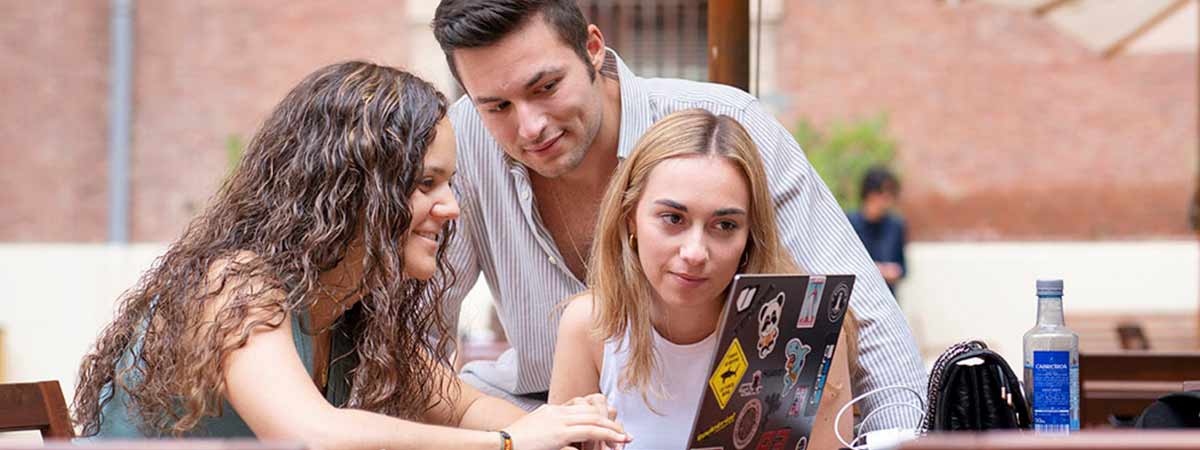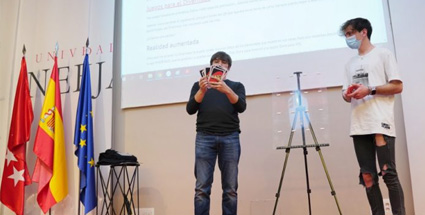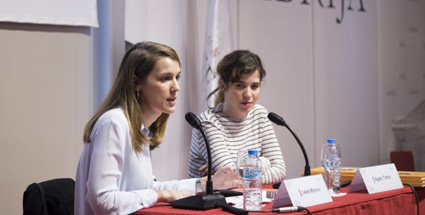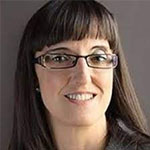Master’s Degree in Research in the Teaching-Learning of Mathematics

Improve your score in public examinations with this postgraduate course in mathematics teaching
Boost your performance in competitive exams with our postgraduate degree, specializing in the teaching and learning of mathematics.
This University Master's Degree offers an academic and research-oriented specialization, focusing on the analysis of mathematical competence development, the challenges in acquiring it, and its instruction, all in alignment with the latest research in the field.
The program is structured around four key pillars: analysis of mathematical skills and their development, informed by the latest scientific findings in the field; the advanced study of the evolution and learning of mathematical thinking; the examination of the most recent scientific contributions related to the enhancement of mathematical competencies and the teaching profile, and the priority focus is on the development of research skills and abilities in this area.
The program is designed to address the need for research in the field from an integrative perspective, harmonizing the relationships between didactic mathematics research and teaching. It aims to guide teachers interested in beginning their research journey in this field.
This program is ideal for teachers interested in specialized training linked to mathematics teaching with a research-oriented profile. It is also beneficial for teachers who wish to enhance their teaching skills based on scientific knowledge.
As the culmination of the year in which the V Centenary of the death of Antonio de Nebrija is commemorated, an exhibition was organized at the National Library of Spain that shows the intellectual profile of the first Spanish humanist, without forgetting him as a man, researcher and professor through his enormous work.
Student profile: The ideal candidates for this program are university graduates or equivalent (bachelor's, associate, or master's degree holders) in educational fields such as Early Childhood or Primary Education, Pedagogy, or Psychopedagogy. Given the multidisciplinary nature of the program, students who have completed the Master's Degree in Teacher Training for Compulsory Secondary Education and Baccalaureate, Vocational Training and Language Teaching, or the Teaching Aptitude Certificate (CAP) are also eligible for the Master's Degree.
Graduate profile: Graduates of this program will be distinguished by their specialized knowledge in the field, enabling them to lead and develop educational research projects related to the development of mathematical competence. The skills acquired will equip graduates to excel in their professional roles as experts capable of meeting the demands (professional, social, academic, and research) arising from various areas related to education. These areas include roles as pedagogical advisors in mathematics, authors of educational material, designers of digital resources, and positions within educational entities, observatories, and research centers. Graduates will possess a high degree of specialization for designing research related to the development of mathematical thinking and/or the teaching-learning process of mathematics.
Official Degree:Master’s Degree in Research in the Teaching-Learning of Mathematics
Learning Center:School of Language and Education
Branch of knowledge: Languages and Education
Places offered: 200
Total Credits 60 credits.
Minimum 12 ECTS credits and maximum 60 ECTS credits per enrollment and academic year.
Duration: 1 year.
Teaching Type:Online
Academic Regulations: General student’s regulations. Credit transfer and recognition. Regulation of student participation. Common procedures for carrying out the Final Research Project
University Services: [+info]
Internal Quality Assurance System System managers Incidents, Suggestions and Complaints Job placement report and assessment of training received
More than 20 years of experience training teachers
Curriculum
The student must take 60 credits
First Semester 30 ECTS
- 6 ECTS | Development of Mathematical Competence
- 6 ECTS | Challenges in Learning Mathematics
- 6 ECTS | Cognitive Processes in Education
- 6 ECTS | Foundations and Research in Teaching Mathematics
- 3 ECTS | Research in Mathematics: The Scientific Method
- 3 ECTS | Seminars: Current Perspectives in Teaching and Learning Mathematics
Second Semester 30 ECTS
Information of the Subjects
More Academic Information
Competences and Outcomes of the teaching and learning process
Knowledge or contents- K1 Compare at an advanced level, based on the latest research in the area, the main milestones in the development and acquisition of mathematical logical thinking.
- K2 Analyze at an advanced level the difficulties in learning mathematics.
- K3 Identify the contributions of cognitive neuroscience to education through knowledge of cognitive processes and their implication in the learning of mathematics.
- K4 Differentiate, at an advanced level, the latest trends in mathematics teaching and methodological strategies for the teaching and learning process of mathematics.
- K5 Analyze the continuous growth of teachers in the area of mathematics as a research objective.
- K6 Explain the process for designing research in accordance with the scientific model within the field of mathematics teaching.
- K7 Identify, at an advanced level, the resources necessary for the analysis and interpretation of statistical data in the area of development and acquisition of mathematics competence.
- K8 Analyze new perspectives in research in the area of mathematics and its teaching.
- S1 Use, at an advanced level, current models on the development of mathematical competence and analyze the latest progress in the study of this discipline.
- S2 Apply advances in the study of difficulties in school learning and its relationship with the development of mathematical thinking in scientific environments.
- S3 Examine the influence of cognitive processes on the acquisition of mathematical competence and its impact on enhancing the teaching-learning process of mathematics, through the study of scientific contributions.
- S4 Apply the latest scientific advances in mathematics teaching and current methodological trends for teaching and learning: numbers, operations, measurements, geometric knowledge, and statistics.
- S5 Plan and execute investigations aimed at solving problems in the mathematics teaching-learning process.
- S6 Reflect on the role of ICT, multimedia content, and different learning environments to enrich research on the teaching and learning process of mathematics.
- S7 Employ advanced specialized techniques for bibliographic search and research, as well as instruments ensuring the proper development of research or innovation work in the master's subjects.
- S8 Utilize, at an advanced level, the most relevant models and methods for collecting, analyzing, and interpreting information to gain a comprehensive research perspective in mathematics teaching.
- S9 Plan the presentation of advanced ideas, complex procedures, or detailed reports of research projects with a high command of academic and scientific mathematical language.
- C1 Analyze and summarize scientific texts that allow for an advanced understanding of new contributions in the field of development, difficulties, and disorders in learning mathematics.
- C2 Solve problems related to logical-mathematical development and mathematics learning from a scientific perspective, incorporating democratic principles, values, and the Sustainable Development Goals as guiding references.
- C3 Demonstrate respect for diversity, universal accessibility principles, and inclusive design based on academic and scientific knowledge in intervention models for difficulties or disorders in learning mathematics, aligned with the Sustainable Development Goals.
- C4 Evaluate and critically assess research based on the latest advances in the development of logical-mathematical skills and mathematics teaching practices.
- C5 Propose diverse strategies, methodologies, and didactic resources to foster the development of logical-mathematical thinking and address its challenges, integrating insights from recent research in the field.
- C6 Independently design new learning environments to develop solutions tailored to specific needs in the field of mathematics, grounded in the latest scientific research.
- C7 Demonstrate proficiency in integrating acquired knowledge into the design and analysis of research in mathematics and its didactics.
- C8 Exhibit knowledge acquisition, skills development, and personal, social, and methodological competencies in the Master's program to develop, present, and defend research in the areas of mathematical logical thinking development, difficulties in learning mathematics, or enhancing the mathematics teaching-learning process.
Online Study
Calendar and Schedules
Synchronous classes compatible with professional activity: Monday-Friday (6-9pm).
Employability
Career Opportunities
Upon completing their master's studies, students will be able to develop their professional activity as:
Testimonials
University Life in Research in the Teaching-Learning of Mathematics
Visit all the Activities of the School of Language and Education

Mathematics for everyone
Nebrija University and the Royal Spanish Mathematical Society analyzed this event on the way of teaching mathematics and researched new teaching methods.
See article
New methods for teaching mathematics
The School of Languages and Education and the ICEMAT (Institute of Mathematical Sciences) held a conference focused on science and mathematics and how to transmit knowledge in classes.
See article




